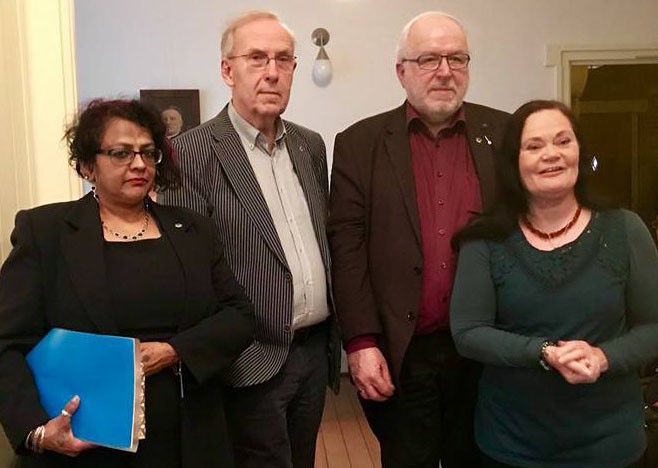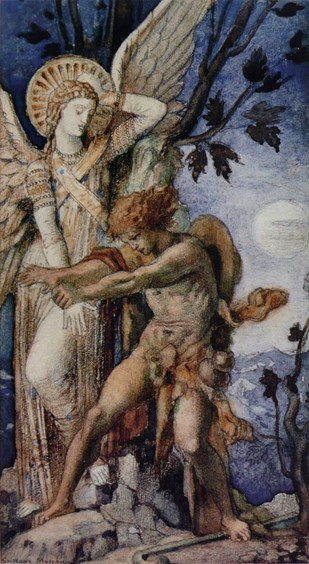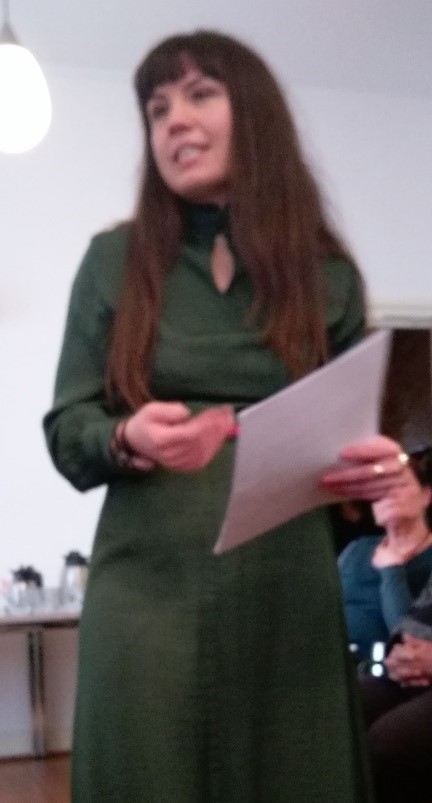UNITED RELIGIONS INITIATIVE, NETHERLANDS
 “Strength for today, happiness for the future” URI New Year Reception, Hofkerk, Amsterdam, Netherlands, January 20, 2018
“Strength for today, happiness for the future” URI New Year Reception, Hofkerk, Amsterdam, Netherlands, January 20, 2018
 |
| From left to right: The new Chairman Hanna Mitra Rambaran, the former Chairman Ari van Buuren, the former General Secretary Bart ten Broek, the new General Secretary Morgana Sythove. (Photo URI 2018) |
The parish hall of the Hofkerk in Amsterdam was more than filled on Saturday January 20, 2018. This year, the New Year’s reception of United Religions Initiative (URI) Netherlands had a special touch. Not only did the Master of Ceremony and Chairman of URI Europe, Duncan Wielzen, introduce the book ‘Interfaith Education for All’, which is a part of an ongoing URI Project that was launched in October 2017. Also, the Chairman of URI Netherlands Ari van Buuren and the General Secretary Bart ten Broek stepped down after many years of work. At the occasion, they shared some of the outstanding highlights they experienced in their work for URI. They also presented the new Chairman Hanna Mitra Rambaran and the new General Secretary Morgana Sythove, and handed the baton over to them. The meeting concluded with a festive and inspiring reception.
 |
| Gustave Moreau 1826 – 1898 Jacob and the Angel 1878 |
The former Chairman Ari van Buuren explained the Dutch play of words ‘zegen vieren, in plaats van zegevieren’. “It is better to celebrate a blessing than to triumph over another.” Where ‘zegen’ means “blessing”, ‘vieren’ “to celebrate” and ‘zegevieren’ “to celebrate victory”, or, “to celebrate triumph, to prevail, to win”. Van Buuren referred to the encounter of ‘Jacob and the Angel’ in Genesis 32,22-32; if an angel it was (Hosea), or a man (Genesis), or a god. Jacob fought all night with his mysterious opponent and could not master him or her. As day broke, Jacob pleaded: “I will not let you go unless you bless me.” Van Buuren concluded, that at the base spiritual capital is paid in little coins in small encounters. In another encounter at a workshop in Berlin, he participated in an exercise. They were asked: “whoever offended, belittled, or insulted you in a religious context?” Then the question was reversed: ”whoever did I offend, belittle or insult in a religious context?” The ensuing discussion was extremely enlightening, but the most moving moment was when a Palestinian woman and Jewish woman exchanged their experiences. Both were mothers and had lost family to the respective armies. How moving it was then to see both women embrace each other in acceptance. The goal is, to come together, to meet at the ground level, like the Interreligious Study Group for Dreams. URI works bottom-up, not top-down.
The former General Secretary Bart ten Broek invited the audience, “don’t judge, lest ye be judged” (Mt 7,1). Religion obviously is important to many. URI works as a bridging opportunity to connect across pitfalls.” In English, URI can also be read as “U, R, I”: you are I. Ten Broek described his experiences as an educator, bringing children of different faiths together at school and the challenges he encountered not only educating the children, but the parents too.
The new chairwoman Hanna Mitra Rambaran pointed out, that to build up “strength for today and happiness for the future”, there is still a lot of work to do in the Netherlands. Of which one of the points of attention may be, that the Dutch are not as tolerant as many like to think, as suggested by the new General Secretary Morgana Sythove, herself of British origin, who has lived and worked in the Netherlands for several decades.
 |
| Anthropologist Sabine Susan Wong: “Patriarchy is a source of cruelty.”
(Photo Kalab 2018) |
Anthropologist Sabine Susan Wong challenged “patriarchy as a source of cruelty, against which many women won’t dare to speak up. If she does, it may be a micro revolution against a culture of cruelty.” To transform a culture of cruelty into a culture of peace, Wong proposed to “embrace the other, accept her, inclusively her needs, or his.”
Translated into ecological terms, it requires us to feed on renewable energy sources, instead on fossil fuels. To achieve peace in any area, religion and spirituality are ‘rich medicines’, to strengthen us and to bring us together. Also the Dali Lama referred to religion as medicine, yet also warned, that no medicine cures every illness. In etymological terms, religion refers to “connect, carefulness, reading a text anew”. Small, loving actions recreate peace, whereby it is crucial, to look not only on to one’s own group, but also to the group of the other, remarked Wong. The speaker continued, that people suffering from depression may stare into the eye of darkness. The demon Mara afflicted Buddha until the end of his life. If we view this as Gautama’s burn out, it tells us also, that he did not give up. Unfortunately, psychologic pain too often gets medicalised instead of being seen as a result of the culture of cruelty. People that are not heard, often have the most precious insights; but, they disturb the culture of cruelty. The goal is, that the seeds of pain will no longer poison our children. We can strive for this and achieve this, by feeling that we are connected with all.
Someone from the audience called for a university chair for URI. The speakers recalled the remarkable change at the ‘Vrije Universiteit’ in Amsterdam, from the former policy of Abraham Kuyper (1837 – 1920) to a now intercultural and interreligious curriculum. They also pointed to R. R. Gazevoort’s interreligious education model. Who knows what changes 2018 will bring?
Lively discussions and networking followed the more formal part of the afternoon. It also happened, when I left the parish hall, that I saw Duncan Wielzen hug Morgana goodbye the Dutch way. Spontaneously I thought, ‘pastor hugs pagan’, and felt, I saw a glimpse of a world to come.
Franz Kalab, Amsterdam, Saturday, 27 January 2018
For more information please e-mail to: mailto:info@religions.nl
For News from URI Netherlands visit http://unitedreligions.nl/nieuws
